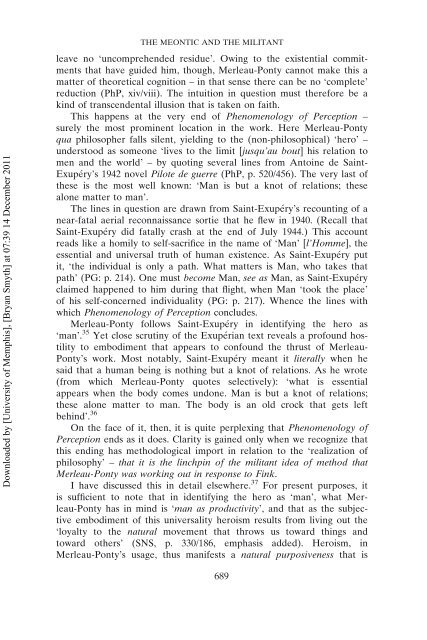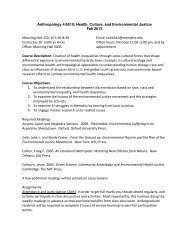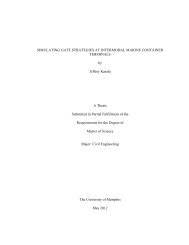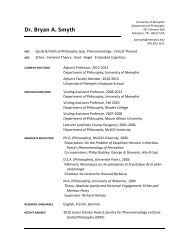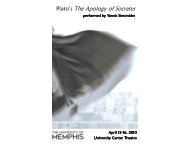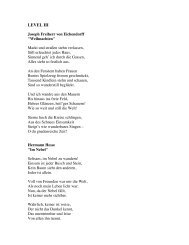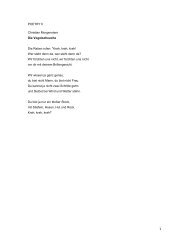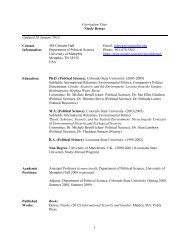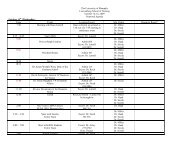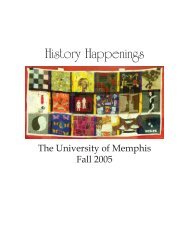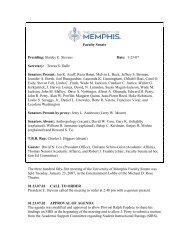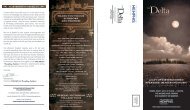The Meontic and the Militant - University of Memphis
The Meontic and the Militant - University of Memphis
The Meontic and the Militant - University of Memphis
Create successful ePaper yourself
Turn your PDF publications into a flip-book with our unique Google optimized e-Paper software.
Downloaded by [<strong>University</strong> <strong>of</strong> <strong>Memphis</strong>], [Bryan Smyth] at 07:39 14 December 2011<br />
THE MEONTIC AND THE MILITANT<br />
leave no ‘uncomprehended residue’. Owing to <strong>the</strong> existential commitments<br />
that have guided him, though, Merleau-Ponty cannot make this a<br />
matter <strong>of</strong> <strong>the</strong>oretical cognition – in that sense <strong>the</strong>re can be no ‘complete’<br />
reduction (PhP, xiv/viii). <strong>The</strong> intuition in question must <strong>the</strong>refore be a<br />
kind <strong>of</strong> transcendental illusion that is taken on faith.<br />
This happens at <strong>the</strong> very end <strong>of</strong> Phenomenology <strong>of</strong> Perception –<br />
surely <strong>the</strong> most prominent location in <strong>the</strong> work. Here Merleau-Ponty<br />
qua philosopher falls silent, yielding to <strong>the</strong> (non-philosophical) ‘hero’ –<br />
understood as someone ‘lives to <strong>the</strong> limit [jusqu’au bout] his relation to<br />
men <strong>and</strong> <strong>the</strong> world’ – by quoting several lines from Antoine de Saint-<br />
Exupéry’s 1942 novel Pilote de guerre (PhP, p. 520/456). <strong>The</strong> very last <strong>of</strong><br />
<strong>the</strong>se is <strong>the</strong> most well known: ‘Man is but a knot <strong>of</strong> relations; <strong>the</strong>se<br />
alone matter to man’.<br />
<strong>The</strong> lines in question are drawn from Saint-Exupéry’s recounting <strong>of</strong> a<br />
near-fatal aerial reconnaissance sortie that he flew in 1940. (Recall that<br />
Saint-Exupéry did fatally crash at <strong>the</strong> end <strong>of</strong> July 1944.) This account<br />
reads like a homily to self-sacrifice in <strong>the</strong> name <strong>of</strong> ‘Man’ [l’Homme], <strong>the</strong><br />
essential <strong>and</strong> universal truth <strong>of</strong> human existence. As Saint-Exupéry put<br />
it, ‘<strong>the</strong> individual is only a path. What matters is Man, who takes that<br />
path’ (PG: p. 214). One must become Man, see as Man, as Saint-Exupéry<br />
claimed happened to him during that flight, when Man ‘took <strong>the</strong> place’<br />
<strong>of</strong> his self-concerned individuality (PG: p. 217). Whence <strong>the</strong> lines with<br />
which Phenomenology <strong>of</strong> Perception concludes.<br />
Merleau-Ponty follows Saint-Exupéry in identifying <strong>the</strong> hero as<br />
‘man’. 35 Yet close scrutiny <strong>of</strong> <strong>the</strong> Exupérian text reveals a pr<strong>of</strong>ound hostility<br />
to embodiment that appears to confound <strong>the</strong> thrust <strong>of</strong> Merleau-<br />
Ponty’s work. Most notably, Saint-Exupéry meant it literally when he<br />
said that a human being is nothing but a knot <strong>of</strong> relations. As he wrote<br />
(from which Merleau-Ponty quotes selectively): ‘what is essential<br />
appears when <strong>the</strong> body comes undone. Man is but a knot <strong>of</strong> relations;<br />
<strong>the</strong>se alone matter to man. <strong>The</strong> body is an old crock that gets left<br />
behind’. 36<br />
On <strong>the</strong> face <strong>of</strong> it, <strong>the</strong>n, it is quite perplexing that Phenomenology <strong>of</strong><br />
Perception ends as it does. Clarity is gained only when we recognize that<br />
this ending has methodological import in relation to <strong>the</strong> ‘realization <strong>of</strong><br />
philosophy’ – that it is <strong>the</strong> linchpin <strong>of</strong> <strong>the</strong> militant idea <strong>of</strong> method that<br />
Merleau-Ponty was working out in response to Fink.<br />
I have discussed this in detail elsewhere. 37 For present purposes, it<br />
is sufficient to note that in identifying <strong>the</strong> hero as ‘man’, what Merleau-Ponty<br />
has in mind is ‘man as productivity’, <strong>and</strong> that as <strong>the</strong> subjective<br />
embodiment <strong>of</strong> this universality heroism results from living out <strong>the</strong><br />
‘loyalty to <strong>the</strong> natural movement that throws us toward things <strong>and</strong><br />
toward o<strong>the</strong>rs’ (SNS, p. 330/186, emphasis added). Heroism, in<br />
Merleau-Ponty’s usage, thus manifests a natural purposiveness that is<br />
689


